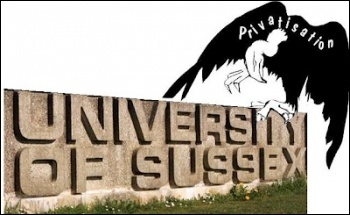
.
Privateers not welcome at Sussex university
On 10 May 2012 University of Sussex management announced plans to sell off huge swathes of support services on campus by August 2013, privatising over 10% of jobs.
Catering and Facilities Management are the staff groups affected, which covers over 30 key support services including Security (even in the context of recent reports of sexual assaults on campus), Estates, Health and Safety, and Dining – which has recently seen a multi-million pound upgrade.
Campus trade unions were given less than 24 hours notice before the university went public with the decision and are yet to clarify whether alternatives were considered. The campus students’ union USSU responded quickly with a statement of concern, not least because only days previously they had been quizzed by university management as to what made Sussex ‘unique’ and had responded that the committed, friendly and familiar staff was what sets the university apart for students!
Unison, UCU and Unite, who represent the affected workers, organised an open meeting on 17 May which saw hundreds of staff and students attend.
Speakers from the trades and student unions were heard before discussion was opened to the floor and the outrage of the crowd was heard in full.
A united campaign was formed involving workers and students – it was agreed that: a vote of no confidence would be held against VC Michael Farthing and his executive group in relevant fora; demonstrations would be held to oppose the two ‘tendering’ meetings which had been arranged for interested profiteers the following week; and given the ruthless determination of Sussex management that strike action would likely be necessary and that plans to that effect must proceed with haste within the affected unions.
Demonstrations
The demonstrations on Tuesday 22 and Thursday 24 May were hugely successful. On Tuesday around 300 staff and students turned out in solidarity with the affected workers whilst management had to move their vulture convention to the nearby Amex stadium.
Speakers condemned the ideologically driven sell-off and Socialist Party members pointed out that ‘support’ staff were indeed the foundations of the university, without which it cannot function.
Despite being presented as vulnerable, support staff are in fact the most powerful workers in the university – as demonstrated by Unison University of Brighton branch whose solid pickets on 30 November forced the university to close.
On Thursday over 200 staff and students turned out again – this time to hear that management had avoided even taking potential profiteers near the campus and had instead booked a meeting room in the city centre!
Campus unions are still awaiting a response from the university management on a number of key questions – any one of which could form the basis of the campaign of industrial action which will be necessary to successfully oppose this sell-off.
Indeed, it would still be possible to take strike action on the basis of a change to the identity of the employer – and Socialist Party members in the campus unions are working to ensure that the necessary preparations are made as soon as possible, and with the full support and leadership of the affected workers.
Committee of Action
We have proposed that as a first step a ‘Committee of Action’ to resist privatisation and defend jobs and conditions should be elected.
This should have a majority of members from amongst directly affected staff. Members of the Unison, Unite and UCU branch committees should also be present and negotiators should be accountable to this committee and mass meetings of the catering and estates staff.
It would make sense for the Committee of Action to co-opt students and other staff as observers to broaden the campaign, and joint demos and meetings should continue (as well as linking the campaign to the wider union and anti-cuts movement in Brighton).
Management will attempt to ‘divide and rule’ and try to persuade some members that it is in their interests to go along with privatisation and rely solely on legal protection such as the ‘TUPE’ regulations (Transfer of Undertakings in Public Enterprises).
When this argument has been accepted by union negotiators, it has invariably led to cuts in services and conditions.
So an indicative ballot should be held as soon as possible to establish that workers affected are prepared to resist privatisation by all means necessary including ‘work to rule’ and strikes, rather than trade jobs and public money for minor concessions for a minority.
Once there is a majority for action we can discuss how best to pressurise management if they still refuse to listen to staff and students.
This might include withholding services from corporate conferences over the vacation, or action directed at degree ceremonies or the registration period in the autumn.
This needs to be decided democratically by the members affected after discussion with the wider campus community.
It is important that we link our fight to wider trade union resistance to the cuts and privatisation agenda that politicians and University of Sussex management have embraced so enthusiastically.
The TUC has called a national demonstration on 20 October, and pressure is growing for a united strike by public and private sector workers in the autumn.
The National Shop Stewards Network has organised a national conference on 9 June to prepare for this. Sussex unions will be represented at that event.
These proposals have been launched concurrently with a research paper from the Working Lives Research Institute (WLRI) which demonstrates the utter ineffectiveness of outsourcing in HE to deliver the goods – “Ideologically motivated outsourcing is demonstrated to be the least effective context” (Progress at work or work in progress).








